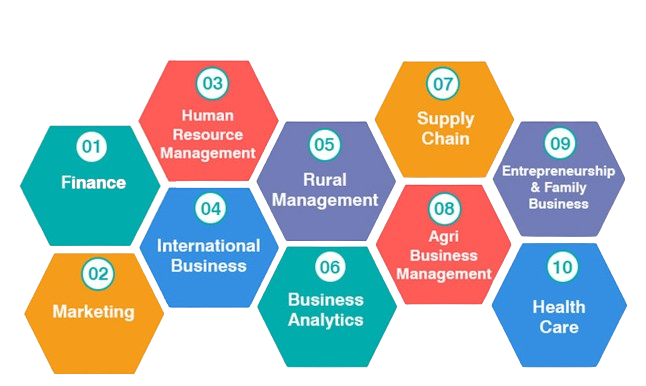WHAT IS MBA
An MBA (Master of Business Administration) is a graduate-level degree program that focuses on developing skills and knowledge in business and management. The course is designed to prepare individuals for leadership and managerial roles across various industries. While specific program structures may vary between institutions, an MBA generally covers a broad range of business-related subjects.

SUBJECT IN MBA COURSE:
MBA programs typically offer a broad curriculum covering various aspects of business and management. The choice of specialization or concentration within an MBA program depends on your career goals, interests, and the industry you wish to work in. Here are some common MBA specializations:

1.Finance
Focuses on financial management, investment strategies, risk assessment, and financial planning. Suitable for those interested in roles like financial analyst, investment banker, or corporate finance.
2.Marketing:
Concentrates on market research, advertising, brand management, and digital marketing. Ideal for individuals interested in product management, brand strategy, or marketing consulting.
3. Human Resources (HR):
Covers topics such as talent acquisition, employee relations, performance management, and organizational behaviour. Suitable for those aspiring to become HR managers, talent development specialists, or organizational consultants.
4. Operations Management:
Deals with supply chain management, logistics, quality control, and process optimization. Relevant for individuals pursuing careers in operations management, logistics, or production management.
5. Information Technology (IT) Management:
Focuses on the intersection of business and technology, covering IT strategy, project management, and technology innovation. Suitable for individuals interested in IT consulting, project management, or technology leadership roles.
6. Entrepreneurship:
Concentrates on developing the skills needed to start and manage a business, including business planning, venture capital, and innovation. Ideal for aspiring entrepreneurs or individuals interested in working with startups.
7. Healthcare Management:
Addresses the unique challenges of the healthcare industry, covering topics like healthcare policy, hospital management, and healthcare finance. Suitable for those interested in leadership roles within healthcare organizations.
8. International Business:
Focuses on global business strategies, cross-cultural management, and international trade. Ideal for individuals interested in working in multinational corporations or pursuing global business opportunities.
9. Supply Chain Management:
Concentrates on the end-to-end supply chain, including procurement, logistics, and distribution. Suitable for individuals interested in roles such as supply chain manager or logistics consultant.
10. Strategic Management:
Emphasizes strategic planning, business analysis, and decision-making at the organizational level. Relevant for individuals aspiring to leadership roles, such as Chief Executive Officer (CEO) or Chief Strategy Officer (CSO).
11. Data Analytics or Business Analytics:
Focuses on leveraging data for informed decision-making, covering areas like data visualization, statistical analysis, and predictive modelling. Suitable for individuals interested in roles like business analyst, data scientist, or data strategist.
12. Sustainable Business or Environmental Management:
Addresses the integration of environmental and social considerations into business practices. Suitable for those interested in sustainable business practices, corporate social responsibility, or environmental consulting.
These are just a few examples, and many MBA programs offer a range of other specializations to cater to diverse career interests. Before choosing a specialization, consider your personal interests, long-term career goals, and the industry or sector you aim to work in. It’s essential to align your MBA specialization with your aspirations for a fulfilling and successful career.
Here are key components typically included in an MBA course:
1. Core Business Disciplines:
Courses covering fundamental business disciplines, including finance, marketing, operations, human resources, and strategy, provide a comprehensive understanding of business functions.
2. Leadership and Management:
Emphasis on leadership and management principles, teaching students how to lead teams, make strategic decisions, and navigate complex organizational challenges.
3. Quantitative and Analytical Skills:
Development of quantitative and analytical skills to analyze data, make informed business decisions, and understand the financial aspects of business operations.
4. Global Business Perspective:
Exposure to global business environments, international markets, and the challenges and opportunities associated with conducting business on a global scale.
5. Entrepreneurship and Innovation:
Many programs include courses that foster an entrepreneurial mindset, covering topics such as innovation, business development, and strategies for starting and managing a business.
6. Specializations:
Opportunities to specialize in specific areas of business based on individual interests and career goals, such as finance, marketing, healthcare management, information technology, or operations.
7. Case Studies and Practical Learning:
The use of case studies, real-world projects, and practical applications of business theories to provide hands-on experience and bridge the gap between academic knowledge and real-world scenarios.
8. Professional Development:
Professional development components, including workshops, seminars, and networking events, to enhance communication skills, leadership abilities, and overall professionalism.
9. Internship or Capstone Project:
Many MBA programs include an internship or a capstone project that allows students to apply their knowledge in a real-world business setting, gaining practical experience.
10. Networking Opportunities:
Networking events, industry speakers, and interactions with alumni to help students build a strong professional network that can be valuable for future career opportunities.
11. Ethics and Social Responsibility:
Discussions on business ethics, corporate social responsibility, and the impact of business decisions on society, emphasise the importance of responsible business practices.
12. Adaptability and Continuous Learning:
A focus on adaptability and continuous learning to prepare graduates for the dynamic and evolving nature of the business world.
MBA programs vary in duration, with full-time programs typically lasting two years and part-time or executive programs designed to accommodate working professionals. The goal of an MBA course is to equip individuals with the skills, knowledge, and mindset needed to excel in leadership roles and contribute meaningfully to the business community.
SCOPE OF MBA:
The scope of an MBA (Master of Business Administration) is vast and extends across various industries and sectors. Pursuing an MBA opens up opportunities for individuals to acquire advanced knowledge, develop essential skills, and enhance their career prospects. Here are key aspects that illustrate the scope of an MBA:
1. Industry Versatility:
MBA graduates are found in a wide range of industries, including finance, healthcare, technology, manufacturing, consulting, and more. The versatile nature of the degree allows individuals to apply their skills in diverse professional settings.
2. Leadership Positions:
MBAs are often sought after for leadership roles. The comprehensive curriculum and emphasis on management and strategic thinking make graduates well-suited for positions such as CEOs, directors, and managers across various departments.
3. Entrepreneurship and Start-ups:
Many MBA programs foster an entrepreneurial mindset, equipping graduates with the skills needed to start and manage their own businesses. The knowledge gained in areas like finance, marketing, and strategy is invaluable for entrepreneurial ventures.
4. Global Opportunities:
The global perspective gained through MBA programs makes graduates attractive to multinational corporations. Many businesses value professionals who understand international markets and can navigate the complexities of global business.
5. Specializations:
MBA programs often offer specializations, allowing individuals to focus on specific areas of interest such as finance, marketing, human resources, operations, healthcare management, or information technology. This specialization enhances expertise in a particular field.
6. Networking and Connections:
The MBA experience often involves building a strong professional network. Networking opportunities provided during the program and through alumni connections can lead to job placements, partnerships, and other collaborative ventures.
7. Salary Advancement:
Pursuing an MBA is often associated with an increase in earning potential. Graduates with an MBA tend to command higher salaries than those without, especially as they progress into managerial and executive roles.
8. Continuous Learning and Professional Development:
The MBA instils a culture of continuous learning, encouraging graduates to stay updated with industry trends and innovations. This adaptability is crucial in fast-paced business environments.
9. Social Impact and Corporate Social Responsibility (CSR):
MBA programs increasingly emphasize the importance of social responsibility. Graduates are equipped to lead organizations that prioritize ethical practices, sustainability, and community engagement.
10. Industry-Specific Skills:
Depending on the chosen specialization, MBA graduates acquire industry-specific skills. For instance, finance-focused MBAs might gain expertise in financial modelling and analysis, while marketing-focused MBAs develop strategic marketing and brand management skills.
11. Consulting Opportunities:
Management consulting is a popular career path for MBA graduates. Their analytical skills, strategic thinking, and business acumen make them valuable assets for consulting firms.
In summary, the scope of an MBA is broad and dynamic. It not only opens doors to diverse career paths but also equips individuals with the skills and knowledge necessary to thrive in the ever-evolving landscape of the business world. Whether pursuing leadership roles in established corporations, venturing into entrepreneurship, or contributing to social impact initiatives, an MBA provides a solid foundation for professional success.
